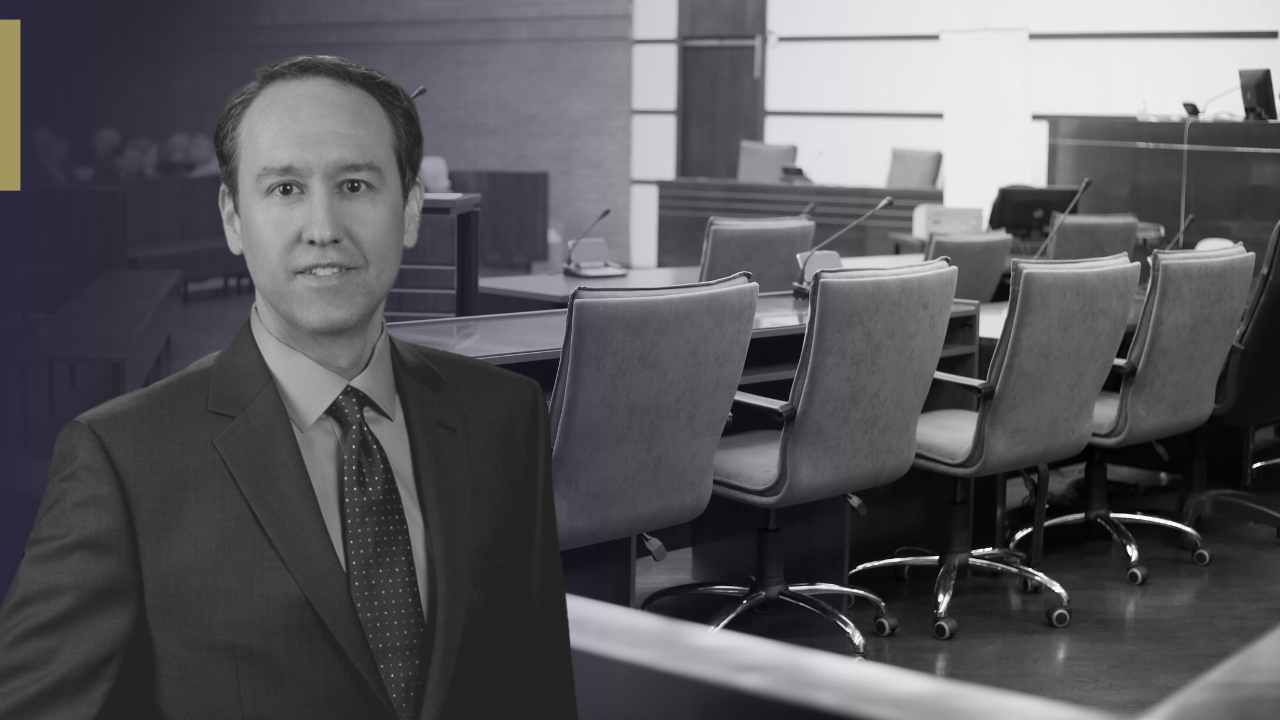When appellate lawyers talk about judges, we ordinarily talk about how wrong they often are and about how to preserve their mistakes for later use. Otherwise, we don’t much speak of the trial judge. Yet, at least in Georgia, every direct appeal begins at the trial court level where appellate lawyers have the unenviable task of convincing trial judges that they made mistakes so bad that the your client should get a do-over. Trials are expensive. Dockets are full. And lawyers and judges aren’t fond of being convinced that they made a mistake. For all of those reasons, it is pretty difficult to win motions for new trial. But when you signed up to handle the appeal, you signed up to do the new trial motion, too. So you might as well do it right.
Having done more of these motions than I can count, I have found that judges take them seriously most of the time. There are a number of good reasons why. If a mistake was made, there is no better time for that fact to come to light than on a motions calendar. Mistakes exposed under the bright light of a published opinion are less preferable. Also, when the average case on the docket calls upon a judge to decide whether the wife gets the tupperware and whether the husband gets the Ginsu knife set, the prospect of taking some time to engage in a dialogue on transferred intent and transferred justification feels like weighty stuff.
In fact, just a few days ago, I presented a legal issue that could only occur in Georgia and her sister states. That issue involved whether an affirmative answer to a question from a prosecutor that used the word “y’all” was sufficient to establish that one person was a victim within a group of victims. That’s right, we debated the actual meaning of, “y’all” in a Georgia courtroom. The judge was engaged.
So, assume that the judge will give it the judge’s all when you have a motion for new trial hearing. And the following suggestions will help you give it your all as well. I think that you’ll find that these suggestions work in other hearings before trial judges as well.
Time and Attention are Your Biggest Obstacles
Time for a little bad news. The judge’s caseload is bigger than yours. Even if you’re the public defender assigned to the judge’s courtroom, the judge’s caseload is still bigger than yours. And the judge has a small fraction of the time that you have to spend on the case even if you think you don’t get enough time to spend on it. The judge has the entire calendar, plus the rest of the criminal docket, plus the entire civil docket. That’s just the way life is.
Time for some even worse news. Your case is more important to you than it is to the judge. And chances are that if this case is important to the judge it’s for reasons you might not like. The judge is concerned with your case to the extent that it is one item in a list of to-do items, to the extent that the judge doesn’t want to get reversed, and to the extent that the judge would like to do a good job on every case. Make sure that you align your goals with the judge’s.
And finally, though the client paid you and has spent some time with you as this case has made its way to this point, your client is not your audience. The judge is. Resist the temptation to hurt your client’s case so that you can impress your client. Taylor your presentation to impress the judge. If you think that deciding to do that might create a problem, make sure you have the discussion with your client. Take careful notes for the file.
Credibility is Key at a Motion for New Trial Hearing
Credibility is the most important thing that you bring to a hearing. It is better to bring credibility to court than the best precedent. And if you aren’t credible, the judge won’t believe your representation of the precedent and probably will never bother to read it. There are two things that you can do to keep your credibility intact. Take ownership of the negative stuff. And don’t say stupid stuff.
There is good and bad in every case. If you’re representing the defendant in a criminal case, the dealer of facts likely gave most of the good cards to your opponent. Spin is okay. So is putting your best foot forward. But don’t ignore bad facts. And never misrepresent them. Assume that your opponent knows the bad facts and will start her argument rubbing your nose in them and the fact that you chose to leave them out. The suggestion that you left them out is far worse than the facts themselves. The judge will wonder what else you left out. You may lose so much credibility that it impacts the next cases you present in that court. So, own your bad facts before your opponent can.
For instance, if you are representing someone whom you know will be sentenced eventually, the process of ownership should start early. Own your bad facts by acknowledging them in your argument or by doing something about them early in the case. Better for you to bring them up than your opponent. And when you own your bad facts, you are more believable when you discuss your good facts.
Your soundest blows land more squarely when the judge knows that they are honest blows.
Secondly, don’t say stupid stuff. Really, don’t. I don’t know if you’re like me in this respect or not. But I find that stupid stuff is easier to spot when other people say it than when I say it. That’s what candid colleagues are for. Run your argument by someone who knows you well enough to call you on it. Don’t have an “accountability partner”? Here are a couple of phrases that might be stupid:
▪ “Judge, this is fundamentally unfair.” Sometimes things are fundamentally unfair. But I’m thinking that something happens that a judge would consider “fundamentally unfair” about 0.1% of the time. Leave that little phrase in the toolbox a much as you possibly can. Chances are you’re calling something fundamentally unfair because you couldn’t find a case on that point.
▪ “Judge, this is a slippery slope.” It probably isn’t. It is better to point out the flaws in the opponent’s argument or the constitutional problems with what the state did than to be the 10th person of the day to try to convince a judge that the sky is falling.
▪ “Judge, it’s been really hard on my client to adjust to the demands of probation” Say this or something like it, and you deserve what happens to you.
▪ With all apologies to clients, because we love them all, corroborate any information whose sole source is your client before you adopt that information as true – particularly, if you are talking about your client’s prior criminal history.
There are a range of other dumb things that one might say in court. What you plan to say probably isn’t dumb, but maybe it is a good idea to check it out with someone you trust before you say it. Don’t say it in brief or letter brief either.
Assume what you Write will Have Less Impact than What you Say
But while we are on the subject of letter briefs or formal briefs with a trial judge, now is a good time for a little word of warning. Judges get a bunch of mail. Have you ever seen the incoming mail for a trial judge? You aren’t the only lawyer sending the judge letter briefs. If you think your mailbox is full of handwritten unsolicited mail from inmates, you should see the number of such correspondence a judge gets. Your letter brief may be the equivalent of an ancient epistle, but it might be read in a moment, if at all. In fact, it might become an ancient epistle before anyone reads it. Think carefully about submitting matters on motions or on briefs. You probably won’t get the judge’s undivided attention the way you might even in a five minute oral argument. The oral argument is the most critical moment your case will spend before the trial court at the appellate stage. Don’t blow it.
Be Organized for When the Moment is Yours
You won’t get long, and you are likely to find your way onto a general motions calendar. In some counties, you may find yourself on a general motions calendar mixed with civil cases – even civil domestic cases. What that means for you is perhaps a day of watching other motions hearings culminating in five to fifteen minutes for your case. What’s worse, you may not quite know when your case will get called. But usually, it gets called just as your mind has gone numb from watching your seventh contempt hearing for failure to pay child support, your tenth probation revocation hearing, your tenth bond hearing, your second TPO involving people who will be back together within a week, and your third motion to suppress. If you think you’re annoyed by what’s just been presented, imagine being the judge.
Organization is key. Know what you will present, when you will present it, and anticipate the questions you are likely to get. Don’t make the judge work to understand your point. Use concrete language supported by case law. An organized presentation will help you get up to speed fast if your case is called while you are counting the number of tiles in the ceiling while two pro se divorce litigants go at it in reckless abandon of the rules of evidence and etiquette.
Don’t Machine Gun Case Cites
Don’t be that lawyer who stands up and starts reciting cases with their cites as you present your argument. It’s like giving the judge a little homework assignment. I can’t imagine the judge going on Lexis or Westlaw at the next recess and looking up those cases. Particularly, since you’re really the one with the homework assignment.
Hand the judge the case you’re discussing, and highlight the portion relevant to your argument. If the language is so great, then the judge will have it. And you’ve just saved her the time it would take to log on to a research program, find the case, and print it out. Which is time your judge likely doesn’t have.
Your window of judicial attention is narrow. And it could close at any minute. Present your best argument first. Present it well. You may not get to your second or third one. By the way, most cases boil down to one big issue anyway. Don’t believe me? Take a look at five random appellate opinions where cases were reversed and remanded. How many cases are there where the appellant won on multiple issues? Your client may be the only person in the room who believes that there are fifteen great grounds for reversal. Don’t become the second.
Don’t be Dramatic
Don’t be dramatic. You’re not speaking to a jury. If you have really must scratch the dramatic itch, then join a community theater group. You likely won’t win a new trial through tears, fist pounding, or with a raised voice. It’s okay to be passionate about an issue. But it is better to treat the judge like a senior colleague. Imagine you were discussing this issue with a partner in your law firm – a colleague more senior than yourself. If you yelled, cried, or pounded the table in that setting, you might be removed from the building. Don’t be dramatic at a motion for new trial hearing either. The trial lawyer who came before you may have done that stuff with the jury. Which may explain why this case is on appeal.
Good Motions Arguments Produce a Great Outline for the Notetaker
If a judge is ever kind enough to tell you what is bothering him about a case, then you should tackle that issue head on. Even if you think the judge’s concerns are misplaced or that the subject matter of the judge’s concerns are unimportant, you should tackle that issue first. For one thing, be glad that the judge is concerned about some component of the case. Because concern equals engagement. Judges aren’t always engaged. And, the great thing about being a judge is that whatever you happen to be concerned about becomes the central concern in the case. If your judge doesn’t signpost her concerns for you, there are some ways to figure them out.
As you read the trial transcript, where did the judge ask the most questions? What hearing took the longest. Of course, the judge might believe that enough time was spent on that issue and believe it to be resolved. There may not be very much more that the judge wants to hear on that point. Still, those area warrant your attention. Otherwise, find the issue that is most likely to be cause for reversal. That area would likely be a point of concern when you point it out.
Also, pay attention to the questions you are getting. Don’t be afraid to shift focus to that area. If the judge is thinking about a certain issue, then the issue is important. If you hadn’t anticipated questions in that area and feel you are not quite prepared, then go as far as you can and admit where you are uncertain. Ask for the opportunity to submit a letter brief or come back, perhaps even later in the day. If you think of other answers later, follow up with a letter brief with cases attached.
A judge who listens to your arguments and takes notes during your presentation is a rare gift. Make sure that you make the most of it. If you notice that the judge is struggling to write things down, then slow down. Repeat what you were saying. Make sure that you make your presentation in such a way that it lends itself to organized notes. Imagine how great it would be if the judge could walk into chambers with your entire presentation written in a neat outline on a piece of paper in the judge’s handwriting. And imagine how great it would be if the judge were unable to create such great notes from your opponent’s presentation. Make sure that you make your argument with previews, headlines, and signposts along the way.
Ask for Questions
A really great way to start your presentation is to ask for questions at the beginning. “Your honor, before I begin my argument, was there any particular concern or question that the court had that you would like me to address first?” If not, then likely you’ll want to make your presentation short.
Which brings me to my final point. Aim to stop talking at the moment your judge has has stopped listening. Only talk beyond that point if you feel you need something for the record. If the judge won’t listen where the judge should, and you are sure that you are right, that’s what the appellate court is for. And you’ll be there soon enough.


